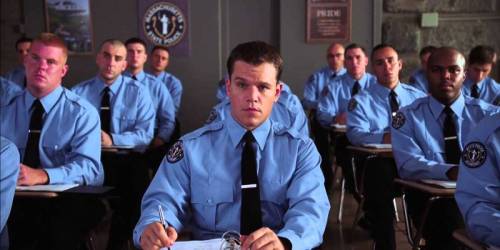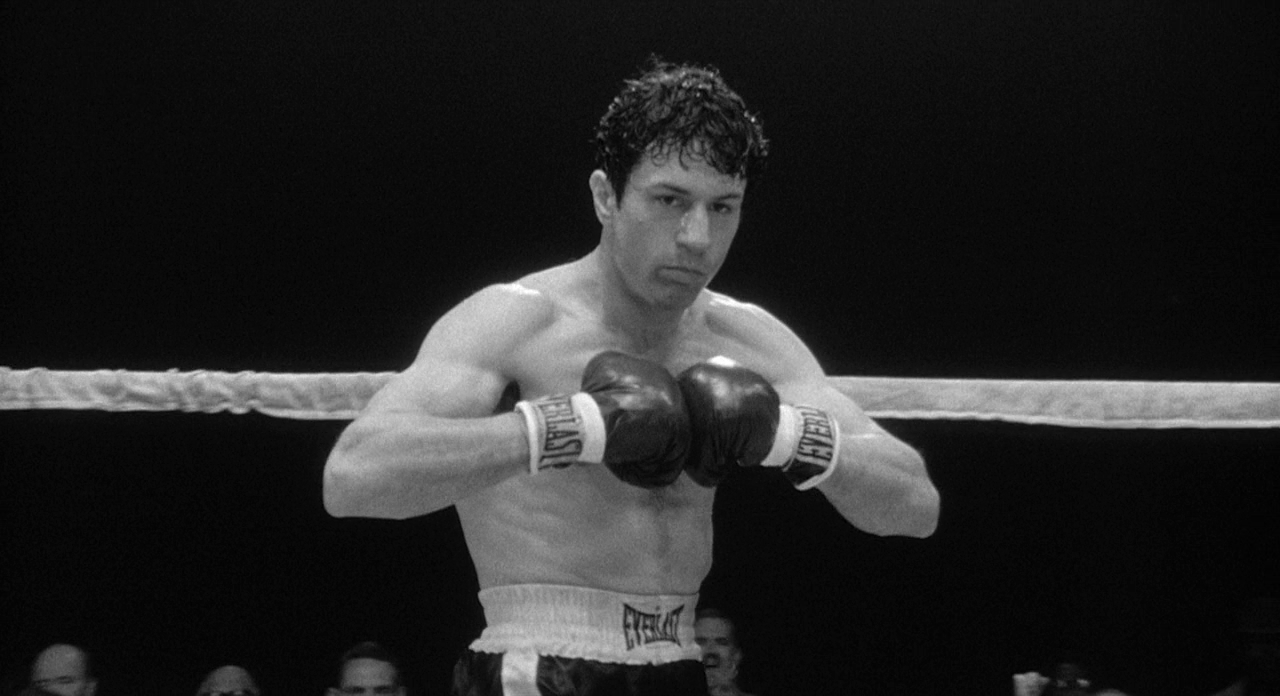The Departed
 Thursday, August 25, 2016 at 10:40
Thursday, August 25, 2016 at 10:40 I gave you the wrong address. But you showed up at the right one.
Successful, enduring criminals – be they of the pocketbook or the heart – must be able to do one thing well, and that thing is lie. They must live under the guise of law-abiding normalcy and profess no knowledge of underworld happenings; yet for them to move up (or down) within this realm, they will have to know how to double-cross, triple-cross, and endure an endless series of betrayals just to emerge victorious. We will need a word far stronger than Pyrrhic to caption such winners' accomplishments, who don't seem nearly as happy as they should be. That is likely because they know full well the ways of the gun, which have replaced the ways of the sword without overmuch changing the outcome. A brief introduction to this much-acclaimed film.
 We begin with an unmistakable voice, for our immediate purposes inhabiting the body of Francis "Frank" Costello (Jack Nicholson). At this point in his career it seems unreasonable to expect Nicholson, who rightfully owns one of cinema's most enduring reputations, to do a role that might disparage his off-screen persona. Thus even without hearing the racist platitudes he utters strolling through the noonday Boston shadows, we know what his philosophy "a man makes his own way" really means. This suspicion is reinforced in a measured early scene in which he stands very still behind sunglasses, his voice slithering from his lips. People at a family diner react to his presence, and their first impression is fear. The second, especially after a lascivious remark directed at the owner's teenage daughter, is disgust; but their third impression is perhaps unforeseeable. As he dismisses the girl from her cashier duties, Costello whispers something in her ear that induces a genuine, coquettish smile; later comments suggest that this type of banter comes to him with enviable ease. So when he turns his attention to a ten-year-old boy by the name of Colin Sullivan, we might expect the mesmerizing of a true prodigy – but this is precisely what does not occur. Costello's life (we begin to get flashbacks of his methods) is neither appealing nor safe; that he is about to turn seventy is a testimony to both his sadistic ruthlessness and a long and passionate affair with Lady Luck. And as Colin, who pleases Costello by unhesitatingly identifying the phrase non serviam with this author, replies that he does indeed do well in school, our gangster finds that they have something in common. "That's called a paradox," Costello quips, talking about himself. But what he is actually saying is that given some of the alternatives in South Boston, a microcosm of life's struggles to an Irish immigrant, organized crime is simply what people do who think the Church, the State, and every authority in between do not really abide by another Latin phrase, Deus est Deus pauperum.
We begin with an unmistakable voice, for our immediate purposes inhabiting the body of Francis "Frank" Costello (Jack Nicholson). At this point in his career it seems unreasonable to expect Nicholson, who rightfully owns one of cinema's most enduring reputations, to do a role that might disparage his off-screen persona. Thus even without hearing the racist platitudes he utters strolling through the noonday Boston shadows, we know what his philosophy "a man makes his own way" really means. This suspicion is reinforced in a measured early scene in which he stands very still behind sunglasses, his voice slithering from his lips. People at a family diner react to his presence, and their first impression is fear. The second, especially after a lascivious remark directed at the owner's teenage daughter, is disgust; but their third impression is perhaps unforeseeable. As he dismisses the girl from her cashier duties, Costello whispers something in her ear that induces a genuine, coquettish smile; later comments suggest that this type of banter comes to him with enviable ease. So when he turns his attention to a ten-year-old boy by the name of Colin Sullivan, we might expect the mesmerizing of a true prodigy – but this is precisely what does not occur. Costello's life (we begin to get flashbacks of his methods) is neither appealing nor safe; that he is about to turn seventy is a testimony to both his sadistic ruthlessness and a long and passionate affair with Lady Luck. And as Colin, who pleases Costello by unhesitatingly identifying the phrase non serviam with this author, replies that he does indeed do well in school, our gangster finds that they have something in common. "That's called a paradox," Costello quips, talking about himself. But what he is actually saying is that given some of the alternatives in South Boston, a microcosm of life's struggles to an Irish immigrant, organized crime is simply what people do who think the Church, the State, and every authority in between do not really abide by another Latin phrase, Deus est Deus pauperum.
Is it all about money? Well, insanity aside, there is no other explanation. Consider when a grown-up Sullivan (Matt Damon) graduates from the academy for Massachusetts State Troopers, still completely under Costello's patronage (that Costello, a publicly-known mobster, drives up to the ceremony grounds is either audacity or a glitch in the plot), and moves into an apartment that will make him "upper class on Tuesday." If his "co-signer" is who we think it is why does he want to draw attention to himself? Is there nothing more suspicious than a cop who lives in a luxurious home? These and many other, admittedly minor points in The Departed are left unaddressed, mostly just to maintain the plot's pleasantly frenetic pacing. As Sullivan is set to be Costello's inside man, we meet a moody, somewhat delicate fellow by the name of William "Bill" Costigan Jr. (Leonardo DiCaprio). While Sullivan seems like he could have come from decent, hard-working folk, Costigan's pedigree is decidedly felonious: his uncle was a high-ranking criminal, as was, we are told, most of his family, and Bill spent weekends in thug-infested Southie. In fact, the only males in his family who did not have a connection to organized crime were Bill and William Sr., whom everyone labeled an underachiever because he worked baggage carts at the airport. Much later in the film, a rather dubious source insinuates that even William Sr. had criminal tendencies, although "he would never accept money" – and whatever that means may depend on what you would do for a bit of coin. With his high SAT scores, gentle manner, and pretty boy looks, Costigan doesn't strike one as a typical cop – even if he has attended and excelled at the same academy that graduated Sullivan. And for that reason, among others, is he a near-perfect candidate to infiltrate Costello's gang.
Counterpoised moles are hardly a novelty and, indeed, The Departed is itself a remake of one of Hong Kong's most successful cinematic ventures. I cannot say I plan to see Infernal Affairs – one of the greatest movie titles of all time – because most of its pleasures will likely already have been filched by Scorsese and his exquisite cast (a scene with Chinese gangsters, a tip of the hat to the original, is perhaps the film's least necessary, merely allowing Costello to indulge in more ethnic slurs). After the identity-switching motif starts feeling at once contrived and too devoid of genuine suspense, one character makes a brilliant leap in logic by entertaining a second character’s advice then reversing it. The utter genius of this tactic is undermined by the fact that it seems to bear fruit that very day, but such is the expediency of the plot. This monumentally fateful decision triggers a slow climax that shines at so many moments it is hard to count them all. The best may be when one mole calls the other, and neither one says a word, both of them fully aware that the person on the line is either the spy each has long sought or a dead man (and, in a way, he is both). Another occurs at a funeral, when we see one character approaching from very far off and know she will not look at much less stop for Sullivan, who issues perhaps the film’s most piteous single line. Yet the film will be remembered not for its moments of silence but for its barbs, most of which are not printable without expunction. Costello gets some of the finest repartees (the quote that ends “With me, it tends to be the other guy” must rank as the absolute best), as does a bilious bully of a cop called Sean Dignam (Mark Wahlberg), who has some choice words about everyone, including federal agents. It is when, however, a dead man turns up that we thought could not possibly be a policeman, but is declared as such by the evening news, that we start to wonder about another scene which suddenly makes much more sense – including the unforgettable line that begins this review.
I have never cared terribly much for this famous trilogy. Yes, Coppola’s works are beautifully, almost tenderly, produced; but the romanticizing of the Mafioso lifestyle belies the ugly truth of its daily business. That is why The Departed and, in a very different way, this brutal masterpiece, are more powerful statements on America’s most revered bandits (this work, also by Scorsese, while at times even-handed, likewise drifts too far down lover’s lane). Although The Departed is very much a character study, the details do not allow us to forget we are dealing with a grim environment (this is, in other words, not a French film). Surveillance and technology sustain shocking failures, fistfights break out regularly over trifles, and, as is usually the case among men who beat heads for a living and those who seek to arrest those men, an endless litany of filth drips from everyone's mouth. The vitriol is pervasive and nasty, but verbal violence, talking the talk, especially in this age of political correctness, is the first rite of the outlaw. The only person somewhat immune to this disease is police psychiatrist Madolyn Madden (Vera Farmiga), the lone female with more than two minutes of screen time and/or four lines of dialogue. Apart from the teenager in the opening scene and a few pro forma 'policewomen' who do nothing more than smile shyly, Madden is the only female who isn't a corpse, nun, hooker, or secretary – the four age-old misogynist categories subscribed to by imbecile men. At least we can report that something will happen to Madden that is wholly predictable, and something else that is dramatically incorrect yet laudable, specifically because it so defies expectations. And does the rest not defy expectations? I think a rat can always see it coming.



